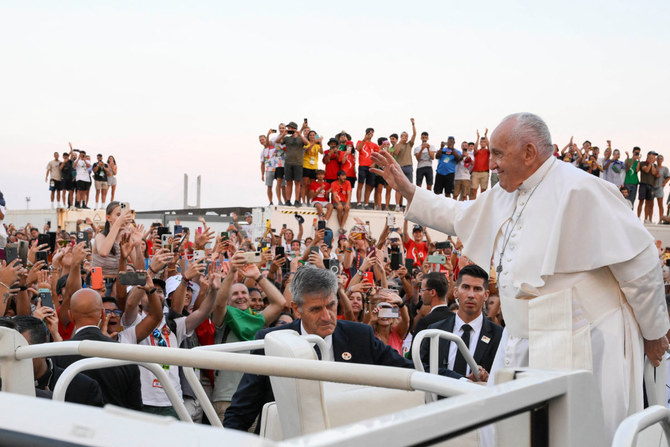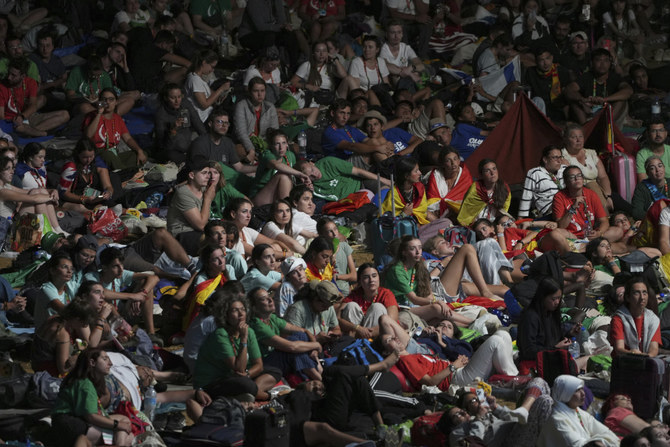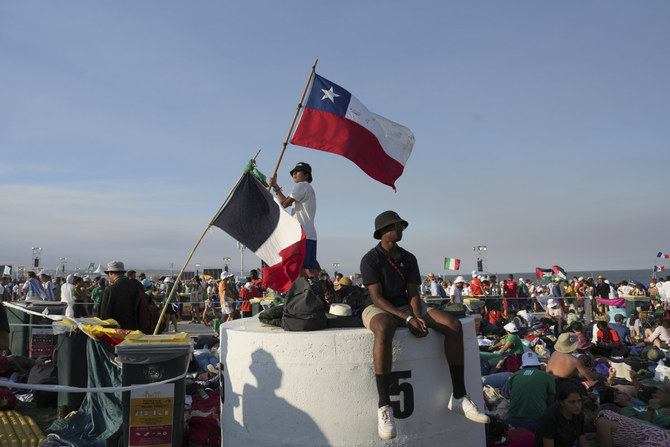LISBON, Portugal: An estimated 1.5 million young people filled a field in the Portuguese capital Lisbon on Saturday for Pope Francis’ World Youth Day vigil, braving scorching heat to secure a spot for the evening prayer and to camp out overnight for his final farewell Mass on Sunday morning.
Francis made only brief remarks before them, however, and ditched his prepared speech for the fourth time in two days. Instead, the 86-year-old pontiff delivered a lively, 10-minute off-the-cuff chat in his native Spanish about journeying together and helping one another. “No fear, thanks, ciao!” he said at the end before aides pushed him in his wheelchair to the side of the stage.
Temperatures had soared to 38 Celsius (95 Fahrenheit) on Saturday in Lisbon and were forecast to top 40 C (104 F) on Sunday. The heat forced pilgrims to shelter under umbrellas and makeshift shades of plastic canvas sheets tied between trash bins in the otherwise exposed field on the edge of the River Tagus.
Crews blew misters at the pilgrims to try to cool them down as they made their way into the venue at the peak of the day’s heat, many flying their national flags. They formed long lines to fill water bottles from what organizers said were more than 400 faucets around the field.
Smoke from a spate of wildfires that broke out around Portugal during a weekend spike in temperatures cast a haze over the sky as they arrived on foot from all around the city for one of the liturgical highlights of the Catholic youth festival. Citing local organizers, the Vatican said an estimated 1.5 million people were on hand.
Lan Young Modesta Cheong, a pilgrim from South Korea, said the heat was bad but her group made use of the trash bins to create shade.
“At first we were not so comfortable with it because is dirty and it maybe smelly but at a certain point it became our tent, it’s kind of a miracle and for me it is a bit the spirit of World Youth Day,” she said. “We started using a useless dirty thing to support us and use it to avoid the heat and all these difficulties.”
Francis presided over the evening vigil after spending the morning at the Catholic shrine in Fatima.
There, he ditched his prepared speech and a prayer for peace. The prayer had been expected to be a highlight of Francis’ visit to Fatima, given the shrine’s century-old affiliation with exhortations of peace and conversion in Russia and the ongoing war in Ukraine.
Francis instead “prayed silently for peace, with pain,” while meditating for a long period before a statue of the Virgin Mary, Vatican spokesman Matteo Bruni said. And the Vatican later posted the prayer on the platform X, formerly known as Twitter.
An estimated 200,000 turned out for Francis’ visit to Fatima, packing the central esplanade long before the red-tinted moon set and the sun rose. Nearby wildfires turned the sky smoky black and sent ash snowing down on the crowd.
“We are here with great joy,” said Maria Florido, a 24-year-old Spaniard who also saw Francis in Lisbon. “We woke up very early to come here and see the pope ... and we’re here with great enthusiasm.”
The Fatima story dates back to 1917, when according to tradition, Portuguese siblings Francisco and Jacinta Marto and their cousin Lucia said the Virgin Mary appeared to them six times and confided to them three secrets. The first two described an apocalyptic image of hell, foretold the end of World War I and the start of World War II, and portended the rise and fall of Soviet communism.
In 2000, the Vatican disclosed the long-awaited third secret, describing it as foretelling the May 13, 1981, assassination attempt against St. John Paul II in St. Peter’s Square, which fell on the anniversary of the original vision.
According to later writings by Lucia, who became a nun and died in 2005, Russia would be converted and peace would reign if the pope and all the bishops of the world consecrated Russia to the “Immaculate Heart of Mary.” Lucia later claimed that John Paul fulfilled that prophecy during a 1984 Mass, even though he never specified Russia in the prayer.
Vatican Media had said before the trip that Francis would pray for peace in Ukraine and the world while in Fatima. It seemed logical, given Francis had already consecrated both Russia and Ukraine to Mary in a prayer for peace following Russia’s invasion of Ukraine, essentially fulfilling Sr. Lucia’s exhortation.
In the prayer posted on the platform X by the @Pontifex account but not read aloud, Francis didn’t name either country but consecrated the church and world, “especially those countries at war,” to Mary. “Open paths where it seems that none exist,” he wrote. “Loosen the tangles of self-centeredness and the snares of power.”
Fatima Bishop Jose Ornelas made a prayer for Ukraine explicit in his remarks. “We associate ourselves to Your Holiness’ prayer for peace, for which this sanctuary is profoundly identified, thinking in particular of the war in Ukraine and so many other conflicts in the world,” he said.
In explaining the changes, Vatican spokesman Bruni said Francis “always addresses firstly the people he meets, as a shepherd, and speaks accordingly.” Francis often deviates from his prepared remarks, even more when speaking in his native Spanish. Bruni denied the changes had any other serious reason, including with his eyesight.
Francis has been hospitalized twice this year, including in June when he spent nine days in the hospital recovering from abdominal surgery to repair a hernia and remove scar tissue on his intestine. Saturday was perhaps the most grueling day of his five-day visit to Portugal, given the round-trip helicopter ride to Fatima and a planned prayer vigil that didn’t begin until his usual bedtime in Rome.
1.5 million brave scorching heat for Pope Francis’ World Youth Day vigil in Portugal
https://arab.news/wdvsh
1.5 million brave scorching heat for Pope Francis’ World Youth Day vigil in Portugal

- Pope to wind up Portugal visit with big outdoor mass
- Temperatures had soared to 38 Celsius on Saturday in Lisbon and were forecast to top 40 C on Sunday
Bangladesh court hears graft case against ex-PM Sheikh Hasina
Three officials from the Anti-Corruption Commission (ACC) read out testimonies in three separate cases over an alleged land grab of lucrative plots in a suburb of the capital Dhaka.
Hasina, 77, fled Bangladesh by helicopter on August 5, 2024, after weeks of student-led protests against her autocratic rule.
She has defied orders to return from India, including to attend her separate and ongoing trial on charges amounting to crimes against humanity, over the deadly crackdown on the uprising.
Hasina has been named in six corruption cases, along with her US-based son Sajeeb Wazed Joy, and her daughter Saima Wazed, who has been serving as the World Health Organization’s Southeast Asia chief in New Delhi.
“If found guilty, Sheikh Hasina, her son Sajeeb Wazed Joy, and Saima Wazed could face up to 14 years in prison,” ACC lawyer Khan Mohammad Mainul Hossain told AFP.
Wazed is on leave from the WHO and a new official has taken up a post as “officer-in-charge.”
In total, six cases have been filed of alleged corruption connected to Hasina.
Among those named in other cases, some slated to be heard later in August, are Hasina’s sister, Sheikh Rehana, and her children — including British lawmaker Tulip Siddiq.
Tulip Siddiq resigned as the UK government’s anti-corruption minister in January, denying any wrongdoing after being named in multiple probes in Bangladesh.
Siddiq’s lawyers have said the allegations against her are false.
sa/pjm/mtp
Neo-Nazi in Scotland pretended to convert to Islam ahead of planned mosque massacre

- Teenager was caught by police, pleaded guilty under Terrorism Act
- His final manifesto said he would attack when ‘the mosque will be at its fullest’
LONDON: The imam of a Scottish mosque has described how a neo-Nazi teenager pretended to convert to Islam as a way to carry out a massacre inside.
The boy, 16 years old at the time of the incident, was caught by detectives in January as he traveled to burn down the Inverclyde Muslim Centre in Greenock, Sky News reported on Monday.
He later pleaded guilty under the Terrorism Act at the Glasgow High Court and will be sentenced at a later date.
The teenager, who cannot be named for legal reasons, was inspired by Norwegian mass murderer Anders Breivik and hoped that the mosque, with a capacity of 275 worshippers, would be full during his attack. He had planned to livestream the massacre after becoming radicalized online aged 13.
He told Imam Mohammed Bilal that he intended to become a Muslim. “I gave him the Qur’an to get more knowledge,” Bilal said.
“He told me that he wanted a balanced life. I asked, ‘What do you mean?’ He said, ‘I want (to be) closer to my Creator if I become Muslim.’”
Hamid Akhtar, also from the mosque, said the planned attack had served as a wake-up call for the area’s Muslim community.
“The frightening bit was that somebody was so nice and so conning. Making us a fool that he wanted to convert, and we were helping him in every way and trusting him,” he told Sky News.
“It gives us a lesson in future about who comes in and what their intentions are. We have more security cameras now.”
The boy, who has an autism diagnosis, believed that Europeans are in a “war” against other races. He authored a “manifesto” on his mobile phone and pledged to “die for my land.”
His final manifesto said he would attack when “the mosque will be at its fullest.” But the door to the mosque was locked, and police were waiting to arrest him after being tipped off.
The rucksack he took contained a German air pistol, ball bearings, gas cartridges and four cans of aerosol spray.
A raid of his home uncovered a copy of Adolf Hitler’s book “Mein Kampf,” knives and bomb-making ingredients.
Local Muslim Adeel Naeen told Sky News: “The event is an isolated event, but I look at the community today and you see the number of people that come through the doors, so we are glad that the police were able to stop anything from happening. The community is still strong in terms of it’s not putting people off from gathering here.”
Colombia presidential hopeful dies after June rally shooting

- Miguel Uribe, 39, was a conservative senator and a grandson of former president Julio Cesar Turbay (1978-1982)
- Authorities have arrested six suspects linked to the attack and the alleged mastermind, Elder Jose Arteaga Hernandez, alias “El Costeno”
BOGOTA: Colombian presidential candidate Miguel Uribe has died two months after being shot at a campaign rally, his family said Monday, as the attack rekindled fears of a return to the nation’s violent past.
The 39-year-old conservative senator, a grandson of former president Julio Cesar Turbay (1978-1982), was shot in the head and leg on June 7 at a rally in the capital Bogota.
Despite signs of progress in recent weeks, his doctors on Saturday announced he had suffered a new brain hemorrhage.
“Rest in peace, love of my life,” his wife Maria Claudia Tarazona wrote Monday morning in a post on Instagram.
“Thank you for a life full of love.”
Authorities have arrested six suspects linked to the attack, including the alleged shooter, a 15-year-old boy captured at the scene by Uribe’s bodyguards.
Following a nationwide manhunt, police announced the arrest of an alleged mastermind behind the attack, Elder Jose Arteaga Hernandez, alias “El Costeno.”
Police have also pointed to a dissident group of the defunct FARC guerrilla group as being behind the assassination.
The attack on Uribe, a leading candidate ahead of the 2026 presidential election, has reopened old wounds in a country wracked by violence.
His own mother, journalist Diana Turbay, was killed in a botched 1991 police operation to free her from cocaine kingpin Pablo Escobar’s Medellin cartel.
Four presidential candidates were assassinated during the worst phase of violence in the 1980s and 1990s under Escobar, who terrorized citizens of Bogota, Medellin and elsewhere with a campaign of bombings.
Sad day for Colombia
“Today is a sad day for the country,” Colombian Vice President Francia Marquez said on social media.
“Violence cannot continue to mark our destiny. Democracy is not built with bullets or blood, it is built with respect, with dialogue.”
Uribe has been a strong critic of Colombia’s first left-wing president, Gustavo Petro, who has sought in vain to make peace with the country’s various remaining armed groups.
He announced in October that he would seek to succeed the term-limited Petro in the May 2026 presidential election.
Uribe was elected to Bogota’s city council at age 26, later becoming its youngest-ever chairperson and then the mayor’s right-hand man.
In 2019, he unsuccessfully ran for mayor of Bogota, but three years later, he was elected a senator — receiving the most votes of any candidate in the country.
He took a seat with the conservative Democratic Center party, founded by former president Alvaro Uribe, no relation.
“Evil destroys everything, they killed hope. May Miguel’s struggle be a light that illuminates Colombia’s rightful path,” former president Uribe wrote on X.
In recent months, Petro, a former left-wing guerrilla, has been accused of dialing up the political temperature by labelling his right-wing opponents “Nazis.”
US Secretary of State Marco Rubio, a frequent critic of the leftist Petro government, demanded justice following the announcement of Uribe’s death.
“The United States stands in solidarity with his family, the Colombian people, both in mourning and demanding justice for those responsible,” Rubio said.
Uribe leaves behind a young son and three teenage daughters of his wife, whom he had taken in as his own.
Nigerian military kills more than 100 ‘bandits’ in northwest raid

- Armed groups called “bandits” by locals have for years been terrorizing communities in northwest and central Nigeria, raiding villages, kidnapping residents for ransom and burning homes after looting
KANO: The Nigerian military killed more than 100 members of a criminal gang in an air and ground raid over the weekend, according to a conflict monitoring report produced for the United Nations and seen by AFP on Monday.
Armed groups called “bandits” by locals have for years been terrorizing communities in northwest and central Nigeria, raiding villages, kidnapping residents for ransom and burning homes after looting them.
The military raid in the restive northwestern state of Zamfara was launched “in the early hours” Sunday in the Bukkuyum local government area, where fighter jets in coordination with ground troops pounded a gathering of more than 400 bandits in their Makakkari forest camp.
The military’s attack “may have occurred in response to consecutive banditry, especially kidnapping, in the state in the previous month,” the report said, noting a link between a recent decrease in military operations in the state and a spate of bandit attacks.
Bukkuyum’s Adabka village was on Friday the scene of a bandit attack that saw residents kidnapped and 13 security personnel killed.
Bandits had been planning an attack on a farming village when “air and ground troops ambushed a bandit camp... killing over 100,” the report said.
A spokesman for the Nigerian army did not respond to an AFP request for comment.
Nigeria’s “banditry” crisis originated in conflict over land and water rights between herders and farmers but has morphed into organized crime, with gangs preying on rural communities that have long had little or no government presence.
Cattle rustling and kidnapping have become huge moneymakers in the largely impoverished countryside.
Groups also levy taxes on farmers and artisanal miners.
The conflict is worsening a malnutrition crisis in the northwest as attacks drive people away from their farms, in a situation that has been complicated by climate change and western aid cuts.
Despite military deployment to fight the criminal gangs since 2015 and the creation of a militia force by the Zamfara state government two years ago, the violence has persisted.
In July, Nigerian troops killed at least 95 members of an armed gang in a shootout and air strikes in the northwest state of Niger.
But the military is overstretched, with banditry spreading out of its northwestern heartland into central Nigeria.
Bandits, who are primarily motivated by money, have also increased their cooperation with Nigeria’s jihadist groups, who are waging a separate, 16-year-old armed insurrection in the northeast.
UK’s Starmer ‘gravely concerned’ about targeting of journalists in Gaza

- Al Jazeera, which is funded by the Qatari government, rejected the allegation, and before his death, Al Sharif had also rejected such claims by Israel
LONDON: British Prime Minister Keir Starmer is “gravely concerned” about the repeated targeting of journalists in Gaza, his spokesperson said on Monday, after five reporters were killed in an Israeli airstrike.
Israel’s military said it targeted and killed prominent Al Jazeera journalist Anas Al Sharif, alleging he had headed a Hamas militant cell and was involved in rocket attacks on Israel.
Al Jazeera, which is funded by the Qatari government, rejected the assertion, and before his death, Al Sharif had also rejected such claims by Israel.
“We are gravely concerned by the repeated targeting of journalists in Gaza,” Starmer’s spokesperson told reporters.
“Reporters covering conflicts are afforded protection under international humanitarian law, and journalists must be able to report independently, without fear, and Israel must ensure journalists can carry out their work safely.”
Asked about the claim that one of the journalists was linked to Hamas, Starmer’s spokesperson said: “That should be investigated thoroughly and independently, but we are gravely concerned by the repeated targeting of journalists.”























